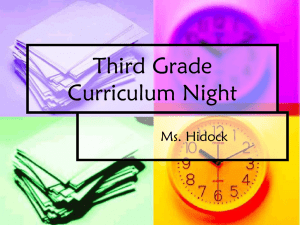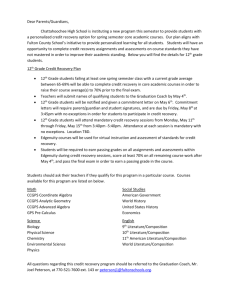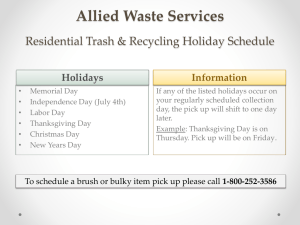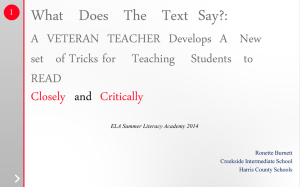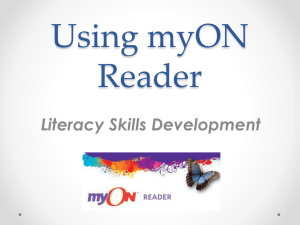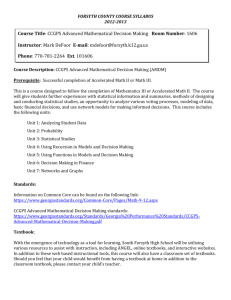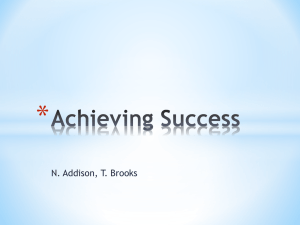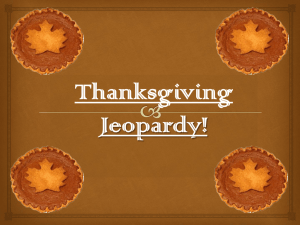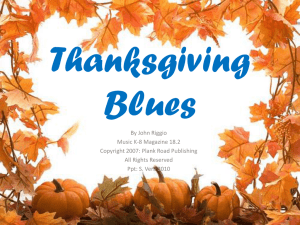File - Gullatt Connection
advertisement
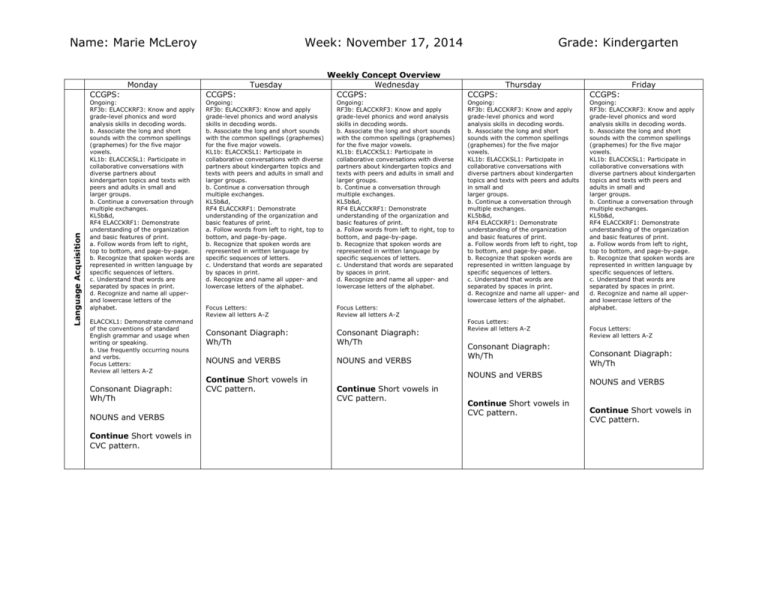
Name: Marie McLeroy Week: November 17, 2014 Monday Language Acquisition CCGPS: Ongoing: RF3b: ELACCKRF3: Know and apply grade-level phonics and word analysis skills in decoding words. b. Associate the long and short sounds with the common spellings (graphemes) for the five major vowels. KL1b: ELACCKSL1: Participate in collaborative conversations with diverse partners about kindergarten topics and texts with peers and adults in small and larger groups. b. Continue a conversation through multiple exchanges. KL5b&d, RF4 ELACCKRF1: Demonstrate understanding of the organization and basic features of print. a. Follow words from left to right, top to bottom, and page-by-page. b. Recognize that spoken words are represented in written language by specific sequences of letters. c. Understand that words are separated by spaces in print. d. Recognize and name all upperand lowercase letters of the alphabet. ELACCKL1: Demonstrate command of the conventions of standard English grammar and usage when writing or speaking. b. Use frequently occurring nouns and verbs. Focus Letters: Review all letters A-Z Consonant Diagraph: Wh/Th NOUNS and VERBS Continue Short vowels in CVC pattern. Tuesday CCGPS: Ongoing: RF3b: ELACCKRF3: Know and apply grade-level phonics and word analysis skills in decoding words. b. Associate the long and short sounds with the common spellings (graphemes) for the five major vowels. KL1b: ELACCKSL1: Participate in collaborative conversations with diverse partners about kindergarten topics and texts with peers and adults in small and larger groups. b. Continue a conversation through multiple exchanges. KL5b&d, RF4 ELACCKRF1: Demonstrate understanding of the organization and basic features of print. a. Follow words from left to right, top to bottom, and page-by-page. b. Recognize that spoken words are represented in written language by specific sequences of letters. c. Understand that words are separated by spaces in print. d. Recognize and name all upper- and lowercase letters of the alphabet. Weekly Concept Overview Wednesday CCGPS: Ongoing: RF3b: ELACCKRF3: Know and apply grade-level phonics and word analysis skills in decoding words. b. Associate the long and short sounds with the common spellings (graphemes) for the five major vowels. KL1b: ELACCKSL1: Participate in collaborative conversations with diverse partners about kindergarten topics and texts with peers and adults in small and larger groups. b. Continue a conversation through multiple exchanges. KL5b&d, RF4 ELACCKRF1: Demonstrate understanding of the organization and basic features of print. a. Follow words from left to right, top to bottom, and page-by-page. b. Recognize that spoken words are represented in written language by specific sequences of letters. c. Understand that words are separated by spaces in print. d. Recognize and name all upper- and lowercase letters of the alphabet. Focus Letters: Review all letters A-Z Focus Letters: Review all letters A-Z Consonant Diagraph: Wh/Th Consonant Diagraph: Wh/Th NOUNS and VERBS NOUNS and VERBS Continue Short vowels in CVC pattern. Grade: Kindergarten Thursday CCGPS: Ongoing: RF3b: ELACCKRF3: Know and apply grade-level phonics and word analysis skills in decoding words. b. Associate the long and short sounds with the common spellings (graphemes) for the five major vowels. KL1b: ELACCKSL1: Participate in collaborative conversations with diverse partners about kindergarten topics and texts with peers and adults in small and larger groups. b. Continue a conversation through multiple exchanges. KL5b&d, RF4 ELACCKRF1: Demonstrate understanding of the organization and basic features of print. a. Follow words from left to right, top to bottom, and page-by-page. b. Recognize that spoken words are represented in written language by specific sequences of letters. c. Understand that words are separated by spaces in print. d. Recognize and name all upper- and lowercase letters of the alphabet. Focus Letters: Review all letters A-Z Consonant Diagraph: Wh/Th NOUNS and VERBS Continue Short vowels in CVC pattern. Continue Short vowels in CVC pattern. Friday CCGPS: Ongoing: RF3b: ELACCKRF3: Know and apply grade-level phonics and word analysis skills in decoding words. b. Associate the long and short sounds with the common spellings (graphemes) for the five major vowels. KL1b: ELACCKSL1: Participate in collaborative conversations with diverse partners about kindergarten topics and texts with peers and adults in small and larger groups. b. Continue a conversation through multiple exchanges. KL5b&d, RF4 ELACCKRF1: Demonstrate understanding of the organization and basic features of print. a. Follow words from left to right, top to bottom, and page-by-page. b. Recognize that spoken words are represented in written language by specific sequences of letters. c. Understand that words are separated by spaces in print. d. Recognize and name all upperand lowercase letters of the alphabet. Focus Letters: Review all letters A-Z Consonant Diagraph: Wh/Th NOUNS and VERBS Continue Short vowels in CVC pattern. Reading Name: Marie McLeroy Week: November 17, 2014 Grade: Kindergarten CCGPS: ELACCKKL2b: Recognize and name end punctuation. ELACCKKL2c: Write a letter or letters for most consonants and short vowel sounds. ELACCKKL2d: Spell simple words phonetically. ELACCKRL1: With prompting and support, ask and answer questions about key details in a text. RL3: With prompting and support, retell familiar stories, including key details. RF.K.4-Read Emergent texts with purpose and understanding. CCGPS: ELACCKKL2b: Recognize and name end punctuation. ELACCKKL2c: Write a letter or letters for most consonants and short vowel sounds. ELACCKKL2d: Spell simple words phonetically. ELACCKRL1: With prompting and support, ask and answer questions about key details in a text. RL3: With prompting and support, retell familiar stories, including key details. RF.K.4-Read Emergent texts with purpose and understanding. CCGPS: ELACCKKL2b: Recognize and name end punctuation. ELACCKKL2c: Write a letter or letters for most consonants and short vowel sounds. ELACCKKL2d: Spell simple words phonetically. ELACCKRL1: With prompting and support, ask and answer questions about key details in a text. RL3: With prompting and support, retell familiar stories, including key details. RF.K.4-Read Emergent texts with purpose and understanding. CCGPS: ELACCKKL2b: Recognize and name end punctuation. ELACCKKL2c: Write a letter or letters for most consonants and short vowel sounds. ELACCKKL2d: Spell simple words phonetically. ELACCKRL1: With prompting and support, ask and answer questions about key details in a text. RL3: With prompting and support, retell familiar stories, including key details. RF.K.4-Read Emergent texts with purpose and understanding. CCGPS: ELACCKKL2b: Recognize and name end punctuation. ELACCKKL2c: Write a letter or letters for most consonants and short vowel sounds. ELACCKKL2d: Spell simple words phonetically. ELACCKRL1: With prompting and support, ask and answer questions about key details in a text. RL3: With prompting and support, retell familiar stories, including key details. RF.K.4-Read Emergent texts with purpose and understanding. SHARED READING: SHARED READING: SHARED READING: SHARED READING: SHARED READING: Thanksgiving Theme Thanksgiving Theme Thanksgiving Theme Thanksgiving Theme Thanksgiving Theme Writing Name: Marie McLeroy CCGPS: ELACCKW2: Use a combination of drawing, dictating, and writing to compose informative/ explanatory texts in which they name what they are writing about and supply some information about the topic. SL.K.5 Add drawings or visual displays to descriptions as desired to provide additional detail. SW complete response to literature to story read aloud. Introduce: B/M/E of story. Week: November 17, 2014 CCGPS: ELACCKW2 Use a combination of drawing, dictating, and writing to narrate a single event or several loosely linked events, tell about the events in the order in which they occurred, and provide a reaction to what happened. CCGPS: ELACCKW2 Use a combination of drawing, dictating, and writing to narrate a single event or several loosely linked events, tell about the events in the order in which they occurred, and provide a reaction to what happened. SL.K.5 Add drawings or visual displays to descriptions as desired to provide additional detail. SL.K.5 Add drawings or visual displays to descriptions as desired to provide additional detail. SW complete response to literature to story read aloud. Review: B/M/E of story. SW complete response to literature to story read aloud. Review: B/M/E of story. Grade: Kindergarten CCGPS: ELACCKW2 Use a combination of drawing, dictating, and writing to narrate a single event or several loosely linked events, tell about the events in the order in which they occurred, and provide a reaction to what happened. CCGPS: ELACCKW2 Use a combination of drawing, dictating, and writing to narrate a single event or several loosely linked events, tell about the events in the order in which they occurred, and provide a reaction to what happened. SL.K.5 Add drawings or visual displays to descriptions as desired to provide additional detail. SL.K.5 Add drawings or visual displays to descriptions as desired to provide additional detail. SW complete response to literature to story read aloud. Review: B/M/E of story. SW complete response to literature to story read aloud. Review: B/M/E of story. Name: Marie McLeroy Grade: Kindergarten MCCK.CC.3: Write numbers from 0 to 20. Represent a number of objects with a written numeral 0-20. MCCK.CC.4: Understand the relationship between numbers and quantities; connect counting to cardinality. MCCK.CC.5: Count to answer how many questions about as many as 20 things arranged in a line, a rectangle array, or a circle, or as many as 10 things in a scattered configuration; given a number from 1-20, count out that many objects. MCCK.CC.3: Write numbers from 0 to 20. Represent a number of objects with a written numeral 020. MCCK.CC.4: Understand the relationship between numbers and quantities; connect counting to cardinality. MCCK.CC.5: Count to answer how many questions about as many as 20 things arranged in a line, a rectangle array, or a circle, or as many as 10 things in a scattered configuration; given a number from 1-20, count out that many objects. MCCK.CC.3: Write numbers from 0 to 20. Represent a number of objects with a written numeral 020. MCCK.CC.4: Understand the relationship between numbers and quantities; connect counting to cardinality. MCCK.CC.5: Count to answer how many questions about as many as 20 things arranged in a line, a rectangle array, or a circle, or as many as 10 things in a scattered configuration; given a number from 1-20, count out that many objects. MCCK.CC.3: Write numbers from 0 to 20. Represent a number of objects with a written numeral 0-20. MCCK.CC.4: Understand the relationship between numbers and quantities; connect counting to cardinality. MCCK.CC.5: Count to answer how many questions about as many as 20 things arranged in a line, a rectangle array, or a circle, or as many as 10 things in a scattered configuration; given a number from 1-20, count out that many objects. MCCK.CC.3: Write numbers from 0 to 20. Represent a number of objects with a written numeral 0-20. MCCK.CC.4: Understand the relationship between numbers and quantities; connect counting to cardinality. MCCK.CC.5: Count to answer how many questions about as many as 20 things arranged in a line, a rectangle array, or a circle, or as many as 10 things in a scattered configuration; given a number from 1-20, count out that many objects. Activity: Number Talks with days in School (Show me the Numeral) Activity: Number Talks with days in School (Show me the Numeral) Activity: Number Talks with days in School (Show me the Numeral) Activity: Number Talks with days in School (Show me the Numeral) Activity: Number Talks with days in School (Show me the Numeral) K.CC.6b Greater Than Less Assessment K.CC.6b Greater Than Less Assessment Thanksgiving Pilgrim TEN FRAME Game Math Week: November 17, 2014 Greater Than/Less Than Materials: counters, greater/less/equal cards, dot or numeral die greater less equal 1. Roll your die. Make a set of counters that is equal to the number you rolled. 2. Make a set of counters that is greater than the number you rolled. 3. Make a set of counters that is less than the number you rolled. 4. Use pictures, numbers, or words to show your work. 5. Continue to roll, make sets, and record your work. K.CC.6b Greater Than Less Assessment Other: Social Studies Name: Marie McLeroy Week: November 17, 2014 Grade: Kindergarten SSKH1: The student will identify the purpose of national holidays and describe the people or events celebrated. Thanksgiving SSKH1: The student will identify the purpose of national holidays and describe the people or events celebrated. Thanksgiving SSKH1: The student will identify the purpose of national holidays and describe the people or events celebrated. Thanksgiving SSKH1: The student will identify the purpose of national holidays and describe the people or events celebrated. Thanksgiving SSKH1: The student will identify the purpose of national holidays and describe the people or events celebrated. Thanksgiving Read Thanksgiving stories Read Thanksgiving stories Create a hand turkey to write things that you are thankful for Discuss and write what you are thankful for on the hand turkey CCGPS: Activity: CCGPS: Activity: Discuss foods. Write a list of 4/5 foods(nouns) that you would like to eat at Thanksgiving CCGPS: Activity: CCGPS: Activity: CCGPS: Activity: None None None None None
